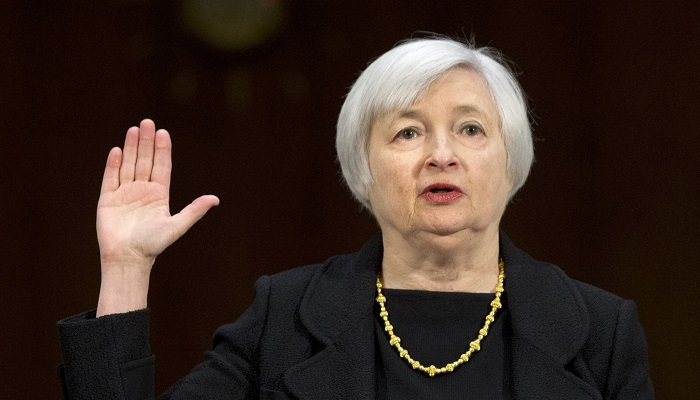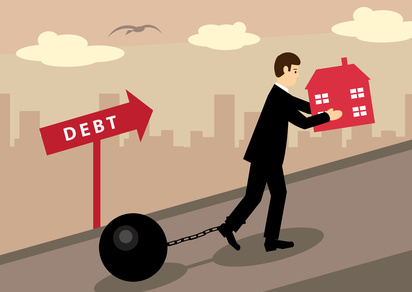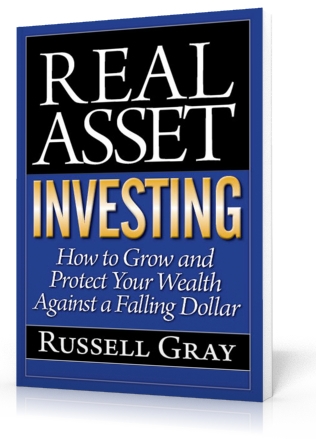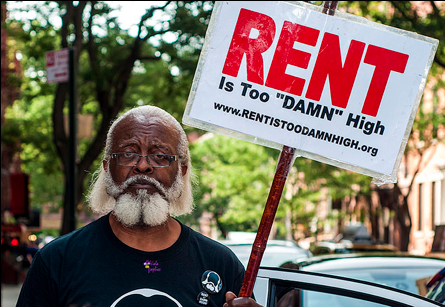Could the Fed’s decision NOT to raise rates be basically an admission this “recovery” is a farce?
 If the economy can’t absorb even a token rate increase, it must be FAR from robust.
If the economy can’t absorb even a token rate increase, it must be FAR from robust.
As we’ve discussed, there’s simply not enough income (productivity) to service all the debt.
It’s like a sub-prime borrower using a teaser rate to squeeze into a home they can’t afford. When rates re-set, their income’s not enough to cover the new payment.
In other words, we have a sub-prime economy hooked on teaser rates. An interest rate increase could push it over the edge.
Of course, the flip side of every problem is opportunity.
Right now, Janet Yellen has a BIG problem. And she thinks housing can help her get out of it.
Check out this headline from Bloomberg…
Janet Yellen Sees a ‘Very Depressed’ Housing Market
“The Fed chief noted… housing ‘plays a supporting role’ to bigger drivers such as consumer and business spending.”
“The central bankers ‘recognize that the housing market is sensitive to mortgage rates’ and that an increase…will eventually impact consumer borrowing costs.”
In other words, Yellen didn’t raise rates so she could prop up housing.
Great!
But…proceed carefully.
First, we’re not sure Janet Yellen will succeed at goosing housing. And that’s okay.
Encouraging consumers to go into debt based on home equity isn’t a smart path to long term economic “recovery”.
Isn’t that how we got here in the first place?
And with interest rates already so low, there’s no room to push up debt based solely on lowering interest rates.
So incomes need to rise.
But competition from low overseas wages and technology put a drag on American wages.
So Yellen might be tempted to revert back to money printing…or more “quantitative easing”.
Long term that’s bad for the dollar.
So mortgages and real estate could be very good things to have in the years to come.
Because, as we discuss in our Real Asset Investing report, mortgages are a way to short the dollar. And in spite of it’s recent “strength”, the dollar has a one hundred year history of loosing value over time. This makes sense because the Fed has a stated goal to create long term inflation.
Real estate is a great way to hedge against long term inflation.
Just be mindful of the fundamentals of value.
REAL value comes from income. The more income, the more value. The less income, the less real value.
But after nearly seven years of artificially low interest rates, trillions of dollars in “stimulus”, and zero meaningful reform of highly leveraged derivative speculation…asset values for stocks and bonds have risen without corresponding increases in income.
So this CNBC article says Wall Streeters turned to Main Street for more real returns…
Investors Snapping Up New Homes for Rentals
 “…large-scale investors buying thousands of discounted foreclosed properties…turning them into single-family rentals….The housing market is recovering…but these investors are not selling. They are buying more, and now they are buying new.”
“…large-scale investors buying thousands of discounted foreclosed properties…turning them into single-family rentals….The housing market is recovering…but these investors are not selling. They are buying more, and now they are buying new.”
This perplexes mainstream pundits who only understand “buy low, sell high”. But the article explains…
“‘…institutional capital is still looking at … a long-term hold…there’s yield and…appreciation to be had.’”
Exactly. Welcome to real estate investing.
Of course, Bloomberg reports that all that big-money bids up prices and takes inventory off the market…
Previously Owned U.S. Home Sales Retreat on Limited Availability
No wonder Wall Streeters are buying new…which of course, makes home builders happy.
As John Burns reported, home builders are beginning to cater to investors instead of only home owners.
But if real value is based on income, how are incomes doing?
Not so good…according to a Bloomberg article:
 “Wages and salaries in the U.S. rose… at the slowest pace on record, dashing projections that an improving labor market would boost pay.”
“Wages and salaries in the U.S. rose… at the slowest pace on record, dashing projections that an improving labor market would boost pay.”
“Private wages were little changed…, the worst performance since those records began in 1980.”
Is this headline from Market Realist provides a little glimmer of hope?
Wage Growth Could Possibly Be Ticking Up
Could…possibly…maybe…kinda sorta…
But then we dig deeper and find:
“Despite falling unemployment, one of the conundrums of the current labor market is flat real, or inflation-adjusted, wages.”
And right in the same article we find out why it matters…
“Historically, real estate prices have correlated closely with wage growth…Recently, home prices have been increasing again, but that’s due to low inventory….the ratio of median home price to median income is again approaching bubble-type highs. As the Fed removes accommodation, further home price appreciation will be dependent on wage growth.”
Of course, rents also come from wages, and this Associated Press article says…
US rental prices up 3.8 pct. in past 12 months; pace slows but still faster than wage growth
“…rental housing costs have been rising nationwide at roughly double wage growth…The result is an affordability crunch for renters.”
This means long term resistance to rental increases…and even pressure to lower rents as people look to move to more affordable housing.
Here’s the bottom line…
The Fed’s decision tells us the economy is weaker than advertised.
Wages are soft. People can’t afford higher debt payments…or higher rents.
But they NEED housing.
So housing and rents are rising. But without wage growth it may not be sustainable.
You shouldn’t count on rising rents or lower interest rates to improve your cash flow.
So it’s REALLY important to BUY RIGHT.
- Choose affordable markets with a good local economy, low taxes and living expenses, and an attractive quality of life for people leaving expensive areas in search of affordable housing.
- Avoid paying too much. Be disciplined. Don’t chase the market.
- Lock in low fixed rate long term financing. The difference in adjustable and fixed rates probably isn’t worth the risk right now.
- If you want an equity pop, force it by adding value. Ditto for rents. Maybe the market will push prices higher, but don’t count on it. The equity tide can rise…and it can recede.
- If you can get available equity out at today’s cheap interest rates, it’s probably a good idea…as long as you have someplace to conservatively invest the proceeds for more than it costs to borrow. Right now, that’s pretty easy.
 When we look at the investment landscape, we agree with the contingent of defectors from Wall Street…stocks, bonds and bank accounts look very scary right now.
When we look at the investment landscape, we agree with the contingent of defectors from Wall Street…stocks, bonds and bank accounts look very scary right now.
But investors have to store their wealth somewhere.
Real estate provides income, long term equity growth, tax breaks and the most affordable form of conservative leverage.
In today’s climate, it’s hard not to like properly structured real estate in the right markets.
So if you have wealth you want to protect and grow…consider real estate.
If you know how to invest in real estate, but are already fully invested…think about starting a business to help other people get into real estate while the getting is still good.
Until next time, good investing!
- Visit our Special Reports library.
- Don’t miss an episode of The Real Estate Guys™ radio show. Subscribe to the free podcast!
- Stay connected with The Real Estate Guys™ on Facebook!
The Real Estate Guys™ radio show and podcast provides real estate investing news, education, training and resources that help real estate investors succeed.













